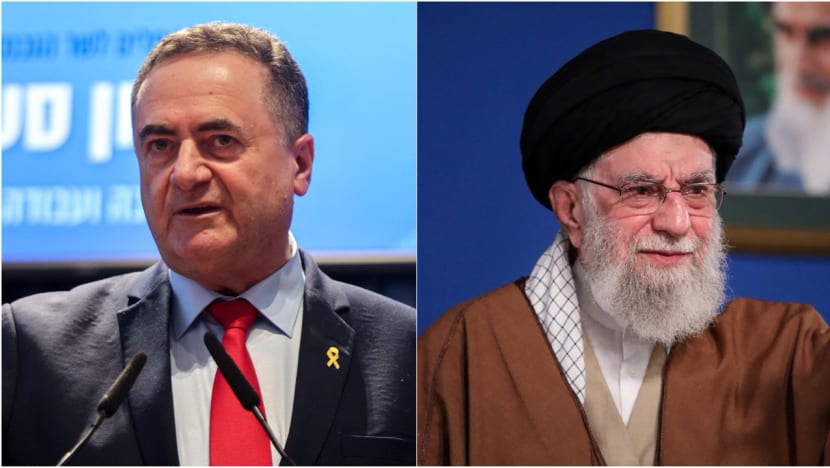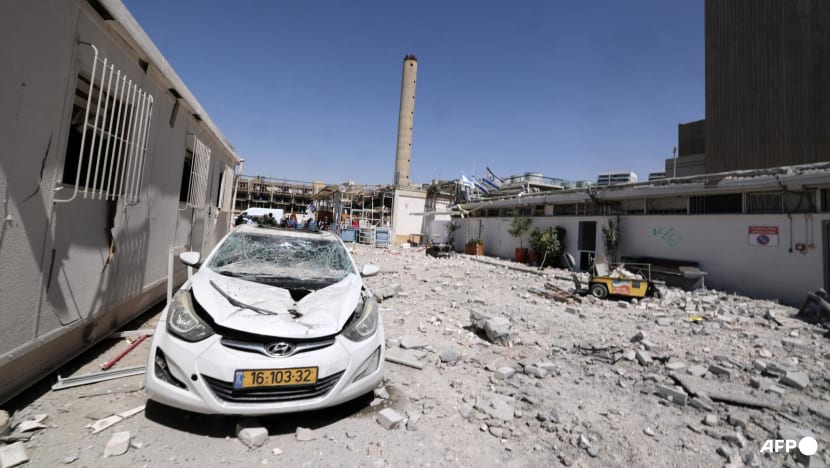Israel minister says Iran leader Khamenei 'can no longer be allowed to exist' after hospital hit
The movements of the supreme leader, who has not left Iran since he took power, are subject to the tightest security and secrecy.

Israeli Defence Minister Israel Katz (left) and Iranian Supreme Leader Ayatollah Ali Khamenei. (File photos: AFP)
HOLON: Israel's defence minister said on Thursday (Jun 19) that Iran's supreme leader Ayatollah Ali Khamenei "can no longer be allowed to exist", just days after reports that Washington vetoed Israeli plans to assassinate him.
The comments from Defence Minister Israel Katz came after the Soroka Hospital in the southern city of Beersheba reported 40 people injured following a fresh salvo of Iranian missiles.
"Khamenei openly declares that he wants Israel destroyed - he personally gives the order to fire on hospitals," Katz told journalists in the city of Holon near Tel Aviv.
"Such a man can no longer be allowed to exist."

When asked about Khamenei on a visit to Beersheba on Thursday, Prime Minister Benjamin Netanyahu said: "I have made it clear that no one is immune."
But he added: "In war, I believe one must choose words carefully and execute actions with precision."
A senior United States official told AFP on Sunday that President Donald Trump had "found out that the Israelis had plans to hit Iran's supreme leader".
"President Trump was against it and we told the Israelis not to," said the US official, speaking on condition of anonymity.
Netanyahu has neither confirmed nor denied the claim.
In a television interview on Monday, he did not rule it out, saying that killing the 86-year-old cleric who has ruled Iran since 1989 would "end the conflict" between the two countries.
Trump wrote on Tuesday that the US knew Khamenei's location but would not kill him "for now".
The White House said on Thursday that President Donald Trump will make a decision on whether the U.S. will get involved in the Israel-Iran conflict in the next two weeks.
Citing a message from Trump, White House Press Secretary Karoline Leavitt told reporters: "Based on the fact that there's a substantial chance of negotiations that may or may not take place with Iran in the near future, I will make my decision whether or not to go within the next two weeks."
Israel launched strikes on Iran last Friday in what it said was an 11th-hour move to prevent it from acquiring nuclear weapons.
It has since hit hundreds of targets, including military commanders, top nuclear scientists and military and nuclear facilities.
"REGIME CHANGE"
The movements of the supreme leader, who has not left Iran since he took power, are subject to the tightest security and secrecy.
Netanyahu has not said publicly that Israel is trying to topple him, only that regime change could be a result of its military action.
Iranians "understand that the regime is much weaker than they thought - they realise it, and that could lead to results", he told a press conference on Monday.
French President Emmanuel Macron has said that any attempt at forcing change through military action would result in "chaos", while both China and Russia have demanded that Israel cease fire.
Iran denies seeking to develop a nuclear weapon, and reports citing US intelligence officials this week have cast doubt on Israeli claims that it has accelerated efforts to produce one.
Iran has been enriching uranium to 60 per cent - far above the 3.67 per cent limit set in a 2015 nuclear deal, which Trump abandoned, but still short of the 90 per cent threshold needed for a nuclear warhead.
Israel has maintained ambiguity on its own nuclear arsenal, but the Stockholm International Peace Research Institute says it has 90 nuclear warheads.















